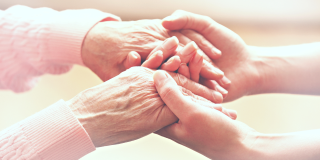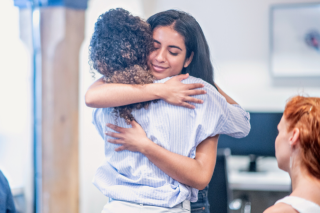
Cancer Caregiver Support

Caregivers Need Support Too
As the loved one of someone living with cancer, your life looks different now. You, as a loved one – a husband, wife, mother, father, brother, sister, son, daughter or friend – now have your own cancer journey, that of supporting someone with cancer. At CanCare we offer help for caregivers of cancer patients by providing emotional support to the cancer patient’s family and friends as well as the cancer patient. Husbands, wives, children, parents, siblings, aunts, uncles, grandparents, grandchildren are also often affected when someone in the family hears those dreaded words, “You have cancer.”

Find Cancer Caregiver Support
Cancer support for family members is especially important because often caregiver spouses are reluctant to share their feelings with the survivor spouse for fear of causing an upset or burdening their loved one. When connected with a CanCare volunteer caregiver who has walked the path of caring for a family member, caregivers can openly discuss their experience of the cancer journey and share their feelings. Getting support for yourself as a caregiver is often a gift to the cancer survivor because cancer survivors often worry about the impact that their cancer is having on their family's emotional, mental health, and even physical health.

Get Emotional Support with CanCare
You may not know how to support a family member who is diagnosed with cancer or who has to undergo cancer treatments. That’s understandable. You’ve probably not done this before. It’s new territory. Learning how to be a caregiver can be confusing. You shouldn’t have to figure out caregiving on your own. CanCare can provide a caregiver by your side as you navigate your cancer caregiver journey. Our cancer support community here at CanCare has been specially trained to provide support to caregivers. Our diverse community enables us to connect you with a caregiver whose relationship to their survivor is similar, if not the same, as yours. We also consider the cancer type and stage of the survivor and age when matching clients with volunteers.
We invite you to
Get Matched with a Volunteer Caregiver
who will give you the emotional
support you need.
How Can I Help My Loved One Who Has Cancer?
1. Be Positive. At this time in history there is so much Hope for those with cancer. Offer your loved one with cancer the reassurance of a hug. Refer to your loved one with cancer as a survivor — not a patient — not a victim. At CanCare we say that anyone who is still standing when they hear, “You’ve got cancer,” is a survivor. A cancer diagnosis is a crisis, but do not assume your loved one will die of cancer. After treatment, more than 55% of cancer survivors live out their normal lifetime cancer-free.
2. Listen. Your loved one with cancer needs to talk about what has happened. Your family member will give you clues about how he/she wants to be treated. Your loved one needs a place to express honest feelings without judgment. It is helpful to stay in touch. Find ways to show you really care.
3. Remember cancer affects the whole family. The whole family needs attention. Show kindness and respect to one another. Each person responds to the diagnosis in their own way.
4. Love and support your loved one. Cancer survivors do not need pity. Pity does not help morale. Encouragement gives confidence to face the realities of cancer. Remember your survivor loved one is likely to feel lonely and afraid. Write a note. Give a book or a video for a laugh. Make a favorite dish. Show love by celebrating life.
5. Pray for your loved one with cancer. Channels for healing are opened by your prayers. Remember God wants all of us to be healthy, whole, happy people. God’s presence brings peace.
6. Express honest feelings. Tears are okay. Though there can be a temptation to “protect” your loved one by hiding your feelings, realize that your family member may also need to cry with you. When you share feelings, even though they may be hard, it prevents the loneliness of dealing with difficult feelings on your own.
7. Use the word cancer. It is only a word for the disease, not a sentence. It makes the survivor feel bad if you always avoid the word and refer to cancer as “your problem”.
8. Avoid making all decisions on behalf of your loved one. Allow the survivor be a part of decision-making. Sometimes he/she may need the normalcy of day-to-day decisions.
9. Offer specific help. Do not say, “Call me any time,” if you don’t mean it. Think about what you can offer, and say what you are willing to do: “I can drive you anywhere, or do any errand for you on Tuesdays,” or “I’ll make the dinner the next two Monday nights.”
10. Be sensitive to visitors. Your loved one may be tired from treatment. Try to encourage friends to come for short, upbeat visits or make positive phone calls. Your loved one needs success stories, diversion, Hope, friendship and you may need respite from care. Encouraging friends, coworkers, other family member contact shows love and consideration. Ask friends to call before they visit. It is likely that your family member may have good days and bad days so you need to be flexible with visitors.
Resources for Cancer Caregivers
Family Caregiver Alliance
800-445-8106
Caregiver Action Network
855-227-3640
Well Spouse Association
732-577-8899
Cancer Caregiver FAQs
-
First and foremost, caregivers give care to the person they love who is dealing with cancer. Care can mean practical assistance like helping with meals, transportation, doctor appointments, appointments for treatment or it can mean offering emotional support to relieve the stress and anxiety of living with cancer. Emotional support might be listening, offering a hug, going for a walk together, watching a favorite TV show, laughing, crying or praying together.
-
Caregiving can create a lot of stress due to handling multiple priorities, balancing work and caregiving, managing intense emotions, adjusting relationship roles, lifestyle factors and financial needs. Stress can affect the way you think, feel and behave. If you are having difficulty concentrating and focusing, ruminating about stressors, feeling overwhelmed, anxious and unable to sleep you may be experiencing distress.
-
If you realize that you are experiencing stress, then you’ve taken the first step to managing it. Now you can take the steps to reduce your stress. One thing that can help with stress is asking for help and support. Those who have experience as caregivers know the stresses of caregiving and can offer support and tell you what they found helpful for their journey. Sharing the burdens and the solutions can diminish the stress load. Request a caregiver match today!
-
Caregivers can be supported by offering to sit with the patient or watch the kids in order to give the caregiver a chance to run errands, go to dinner, or watch a movie. Another idea is to organize a meal train for the family. The next time you are headed to the store, send a text to the caregiver and ask what you can pick up for him or her. One of the most powerful things you can do to support a caregiver is to pray for him or her, specifically for strength, wisdom, and peace. Submit a prayer request today!
-
Review these 10 tips with your cancer survivor to see if they would find these suggestions helpful.
-
At CanCare we consider anyone who loves someone with cancer a caregiver. It is not uncommon that caregivers live at a distance from the person they love who is dealing with cancer. Caregiving from a distance has stressors of its own and we have Volunteer Caregivers who have cared for someone remotely, including internationally.
-
We provide emotional support for cancer caregivers by connecting you with a caregiver whose relationship to the survivor, e.g., husband, parent, child, and the cancer type and stage of the survivor is similar, if not the same, as yours. We invite you to join us by requesting to be matched with a Volunteer Caregiver who will give you the support you need, click here.
We also offer an online support group for caregivers. Our caregiver support group meets the 2nd Friday of the month from 12PM – 1PMc. Contact groups@cancare.org for more information and the link to join one of these monthly cancer caregiver support groups. -
Yes, with our large community of volunteers we can usually connect you with someone who has experience with a similar, if not the same, treatment. Though we do not provide medical advice, your volunteer can share his/her experience with you.
See what our clients are saying
... View Full Story"I contacted CanCare and spoke to a woman who had faced and won the battle I was fighting. I felt so uplifted and re-energized to continue fighting and accept what was happening."
... View Full Story"One morning while in Houston Methodist Hospital for transplant, a CanCare volunteer knocked on the door. He sat and shared with Ron and Ina about his time not just in the same hospital, but in the very same room as Ron! That day they found a new best friend in this CanCare volunteer. Ron and Ina both took a deep breath, seeing a survivor walking and sharing his story and listening to theirs. It was uplifting for both and gave them a sense of hope."
... View Full Story"I am a proud supporter of CanCare! Without CanCare, I think I could still be searching for someone that understands my specific challenges and perhaps would still be struggling with how to move forward."
... View Full Story"As a client of CanCare and as a caregiver, I felt witnessed and heard. My CanCare mentor-volunteer was actually an ovarian cancer survivor. Usually, CanCare ensures cancer patients are matched up with survivors and caregivers are matched with caregivers. I am grateful to this day for CanCare’s creativity in pairing up a volunteer survivor with a caregiver client."
..."Nargis has been a pleasure to talk to. She is so sweet and kind and I really enjoy hearing about her experience compared to mine."
..."My Cancare volunteer became my friend I love and appreciate Kim!"
"I deeply appreciate your help and talking with Wanda has really been helping me through this diagnosis and in sorting through my thoughts and feelings. She is kind, listens, is very comforting, and a wonderful person."...
..."This is a great program you have. Nothing like support from someone who really knows what you are going through."
..."I am so grateful and thankful CanCare matched me with Claudette who had kidney cancer in 2001 and has been cancer free all these years. She gave me so much hope and assuaged all my fears about the surgery and outcome. We talked over an hour the first time and we have stayed in touch since my surgery Sept 20. Claudette and I continue in stay in touch and we hope to meet for lunch when I am feeling better. I have already referred a friend to CanCare. She is about to have a double masectomy. Thank You for your program. I am the first in my family to have cancer so had so many questions I forgot to ask the day I received the results of my CT scan."
..."I am forever grateful for Anthony, Tom, and Greg. All have in their own special ways helped me deal with a very difficult situation. Anthony is my rock. Someone who stays in contact and always provides support and encouragement. Tom reaches out and listens to me, and talking helps tremendously. Amazingly, Greg and I share doctors and have the same cancer. Being able to talk with someone who is on a very similar journey brings me comfort and peace."
..."My volunteer met with me for several hours over coffee to talk about her fight and answered so many questions I had about my daughter's diagnosis."
..."I thank you very much for offering this service. It help me when I was overwhelmed with my husband's cancer."
..."Brenda in Texas is kind and understanding. She gave freedom to contact her anytime. She always gets right back in touch with me. Thank you for having this service available to us cancer patients who live with the unknown. Brenda has wonderful faith that rubs off onto me. Thank you again."
..."I am just starting my journey with cancer. My volunteer has been great. Thanks for connecting us!"
..."Wonderful organization and excellent and compassionate service for both staff and volunteers."
..."My volunteer has been a great help to my wife (tongue cancer)."
..."She’s been a huge blessing to my life, amongst this worldwide crisis. I can’t wait to meet her in person when this is all over (or passes us.)"
..."Trish was the best I couldn’t have gone through this without her!"
..."This is a must! So needed so valuable."
..."The response by your team when I reached out was immediate and amazing. I felt their interest and caring was totally sincere."

